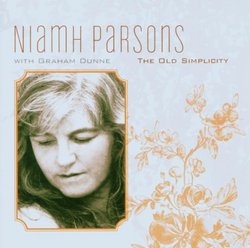"But all their songs are sad"
John L Murphy | Los Angeles | 06/13/2006
(3 out of 5 stars)
"So Parsons sings on the album's last cut, one of many anti-war among other downbeat themes on this mixture of new and old folk. Individual cuts work well, especially in the latter third of the album, but too many sluggishly paced tunes early and midway hobble the pace. Parsons and her guitarist, Graham Dunne, do intersperse his instrumentals regularly into the sequence, so the duo are aware of the need to vary the assortment. Her voice, which is one of my favorites among Irish singers, avoids the smokiness of June Tabor or the pierce of Jacqui McShee or the purity of Sandy Denny, to name three earlier influences from the 60s. Yet she too like these predecessors tries on this album to broaden her range of songs, moving away from the Irish trad concentration of some earlier albums. Fittingly, Parsons covers "He Fades Away," a song about a wife caring for her dying mate, that Tabor had sung on her own "Against the Stream." Like Tabor, Parsons on her latest album moves away from folk into a more eclectic, if leaner, stripped-down delivery of contemporary songwriters' contributions. Fans of Tabor, especially, may like what Parsons does here, working mostly with only guitar accompaniment, but I prefer Parson's livelier efforts to this rather po-faced array of nearly all very very serious songs.
This is three stars only by comparison with her last three records, "In My Prime," "Blackbirds and Thrushes," and "Heart's Desire," which were all noteworthy. If compared to other singers, this album on its own apart from Parsons' own body of work would rank higher. "TOS" does stand out for its dignity and poise.
The fate of WWI's youngest soldier (signed up at 12 to get a pair of boots), a French prostitute's reflections on the 1917 soldiers she services, a wife's view of her husband's descent into alcoholism, two songs about asbestos-plagued miners, the fate of the San Patricio Battalion who fought against the US in the Mexican War: these are only some of the subjects. While Parsons has chosen intelligent lyrics by Linda Thompson, Kieran Halpin, Alastair Hulett, David Olney, Maria Dunn, and Ron Kavanagh, the preponderance of gloom powerfully overshadows the lighter (somewhat only by comparison!) traditional tunes and instrumentals. While I recommend this album in its smart ideas well sung, for music, I would choose earlier solo albums by Niamh Parsons for newcomers to her work. Congratulations to her for a smart selection of modern folk protest songs, but putting so many onto one album does bring the whole record's spirit further down than these few, already sparse and sparely recorded, songs can sustain without making the listener feel maudlin over 45 minutes."


 Track Listings (14) - Disc #1
Track Listings (14) - Disc #1